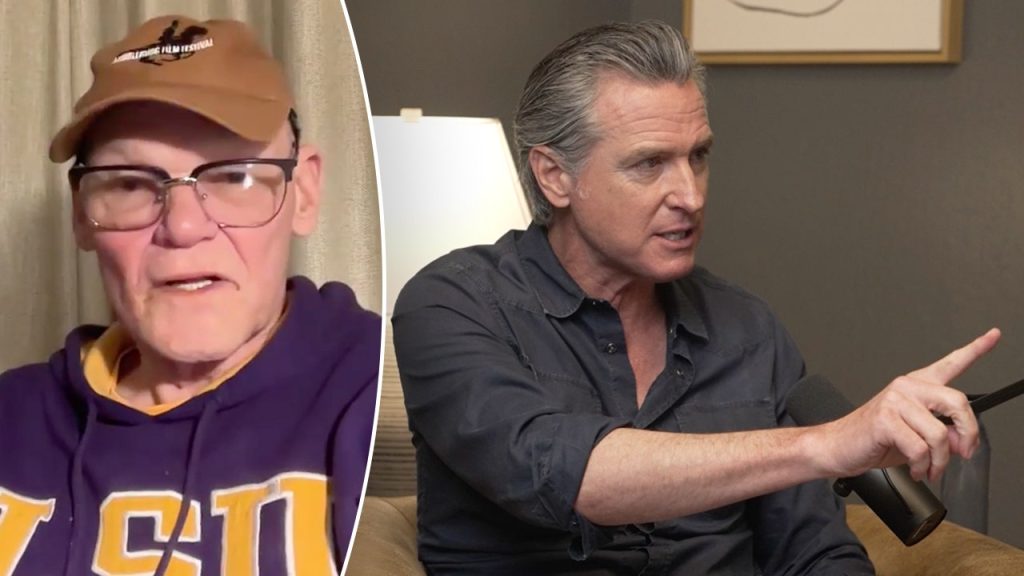A shift in the Democratic stance regarding transgender athletes participating in women’s sports is gaining attention, particularly following comments made by California Governor Gavin Newsom. Veteran Democratic strategist James Carville predicts that more party members will align with Newsom’s views, which indicate concerns over fairness in athletic competitions. A recent poll underscores a potential divide between party leadership and the general public, as a significant majority of Americans, including many Democrats, oppose allowing biological males to compete in women’s sports.
| Article Subheadings |
|---|
| 1) Newsom’s Stance on Transgender Athletes |
| 2) Public Opinion on the Issue |
| 3) Implications for the Democratic Party |
| 4) Legislative Actions and Reactions |
| 5) The Role of Athletic Associations |
Newsom’s Stance on Transgender Athletes
In a recent podcast with Turning Point USA founder Charlie Kirk, Governor Gavin Newsom expressed strong reservations regarding biological males competing in women’s sports. He labeled such participation as “deeply unfair,” stirring controversy amidst rising concerns over the integrity of women’s athletics. Newsom’s statement marks a notable departure from the prevailing assumptions within parts of the Democratic Party, which have supported inclusivity over competitive fairness. Carville believes that Newsom’s comment is not an isolated incident and anticipates that other Democrats may adopt similar views, indicating a potential shift in the party’s stance on this contentious issue.
Public Opinion on the Issue
According to a January poll conducted by The New York Times, approximately 80% of Americans are opposed to allowing biological males to compete in women’s sports. This sentiment is shared across party lines, with 67% of Democrats also expressing similar views. Such overwhelming opposition raises questions about the Democratic Party’s strategy moving forward. While party leaders have maintained a supportive position regarding transgender athletes’ rights, grassroots support appears to be largely against it. This discrepancy poses a troubling dilemma for Democratic politicians who find themselves at odds with their constituents on what many consider a fundamental issue of fairness in sports.
Implications for the Democratic Party
As the party grapples with its public image, Carville warns that continuing to promote a perspective sharply at odds with popular opinion may lead to electoral repercussions. He noted, “If you think the issue is that important, then you got to convince people,” suggesting that Democrats need to reevaluate their approach to win the trust and votes of the broader electorate. By demanding adherence to controversial policies, he cautions, the party risks alienating its membership and giving undue advantage to the opposition. Notably, both Newsom and Representative Seth Moulton have begun aligning their narratives with this emerging viewpoint, suggesting a growing acknowledgment within the party of the urgent need to connect with voter sentiments.
Legislative Actions and Reactions
In response to these growing concerns, recent legislative actions have illustrated the divide. Earlier this month, Senate Democrats blocked a bill that aimed to prohibit transgender athletes from participating in women’s sports competitions. This move garnered significant criticism, particularly because the public seems to favor the ban. Carville also expressed a nuanced view regarding the block, highlighting the complexity of the issue and suggesting that it should be less about legislative overreach and more about internal party strategy. He implied that it is crucial for elected officials to gauge public sentiment accurately and develop policies accordingly if they wish to maintain their electoral viability.
The Role of Athletic Associations
As the debate simmers, Carville emphasized the need to leave decisions regarding athlete eligibility to appropriate governing bodies rather than legislating from a state or national level. He referenced the governor of Utah, who dismissed the necessity of an anti-trans sports bill by stating, “Look, I have 100,000 high school athletes in the state of Utah. I got four that are trans. This is not my problem.” Such practical assessments point toward the view that athletic associations should be the ones resolving these eligibility issues based on their specific contexts. Carville argued that involving state legislature only complicates the matter further, and solutions should be developed by organizations like the NCAA or the Olympics instead.
| No. | Key Points |
|---|---|
| 1 | Governor Gavin Newsom has voiced opposition to transgender athletes competing in women’s sports, calling it unfair. |
| 2 | Recent polling indicates that 80% of Americans and 67% of Democrats oppose allowing biological males in women’s competitions. |
| 3 | Veteran strategist James Carville believes that Democratic leaders could face electoral backlash for ignoring public sentiment. |
| 4 | Senate Democrats recently blocked a proposed bill banning transgender athletes, which has sparked debate within the party. |
| 5 | Carville advocates that athletic associations should manage eligibility issues, rather than state legislation interfering in the process. |
Summary
The discussion surrounding transgender athletes in women’s sports is fraught with political implications as both public opinion and internal party dynamics collide. Governor Gavin Newsom‘s recent comments underscore a significant turning point, suggesting that even within the Democratic party, there is growing acknowledgment of the complexities surrounding fairness in athletics. As various factions within the party navigate this contentious issue, the ability to listen to constituents may determine both the political future and efficacy of Democratic leaders. Addressing such a sensitive issue with respect to public sentiment is essential for electoral survival.
Frequently Asked Questions
Question: What did Governor Newsom say about transgender athletes?
Governor Gavin Newsom expressed that allowing biological males to compete in women’s sports is “deeply unfair,” indicating a rethink of the party’s stance on this issue.
Question: What do recent polls indicate regarding public opinion on transgender athletes in sports?
Recent polling data indicates that 80% of Americans oppose biological males competing in women’s sports, including a significant number of Democrats.
Question: What suggestions did James Carville offer concerning the issue?
James Carville suggested that the Democratic Party should align its policies more closely with public opinion and allow athletic associations to determine eligibility of athletes rather than insisting on legislative solutions.
